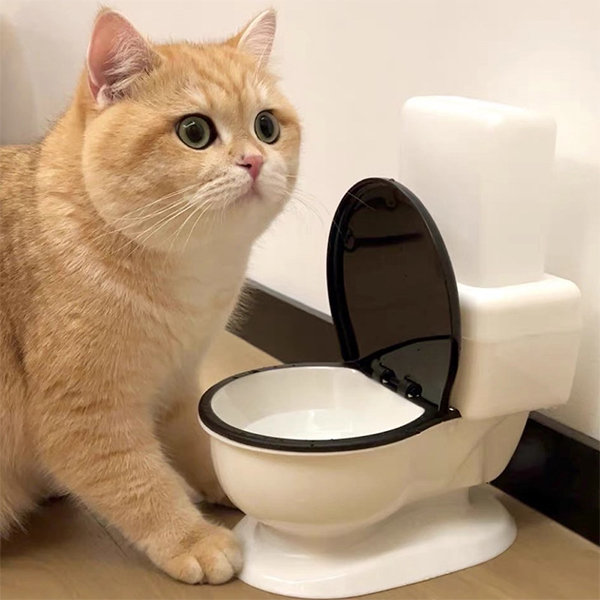Prevent Plumbing Problems: Don't Flush Cat Poop Down Your Toilet - Expert Guidance
Prevent Plumbing Problems: Don't Flush Cat Poop Down Your Toilet - Expert Guidance
Blog Article
What are your thoughts concerning Don’t flush cat feces down the toilet?

Intro
As cat owners, it's important to bear in mind just how we take care of our feline close friends' waste. While it might seem hassle-free to flush pet cat poop down the toilet, this technique can have destructive consequences for both the setting and human wellness.
Alternatives to Flushing
The good news is, there are safer and a lot more accountable ways to take care of feline poop. Consider the adhering to alternatives:
1. Scoop and Dispose in Trash
One of the most usual approach of getting rid of cat poop is to scoop it right into a naturally degradable bag and toss it in the garbage. Make sure to use a devoted trash scoop and take care of the waste immediately.
2. Use Biodegradable Litter
Go with eco-friendly pet cat litter made from products such as corn or wheat. These litters are eco-friendly and can be safely thrown away in the trash.
3. Bury in the Yard
If you have a lawn, consider hiding pet cat waste in a marked location far from veggie gardens and water sources. Be sure to dig deep adequate to prevent contamination of groundwater.
4. Install a Pet Waste Disposal System
Purchase an animal waste disposal system specifically developed for cat waste. These systems utilize enzymes to break down the waste, decreasing smell and ecological impact.
Health Risks
In addition to environmental worries, flushing cat waste can additionally posture health and wellness threats to human beings. Pet cat feces may consist of Toxoplasma gondii, a parasite that can trigger toxoplasmosis-- a potentially extreme ailment, particularly for expecting ladies and people with damaged body immune systems.
Ecological Impact
Purging feline poop presents hazardous pathogens and parasites into the water, presenting a substantial danger to water environments. These pollutants can adversely affect aquatic life and compromise water quality.
Final thought
Accountable animal possession prolongs past providing food and sanctuary-- it also entails appropriate waste administration. By avoiding purging feline poop down the toilet and selecting alternative disposal methods, we can minimize our ecological footprint and secure human wellness.
Why Can’t I Flush Cat Poop?
It Spreads a Parasite
Cats are frequently infected with a parasite called toxoplasma gondii. The parasite causes an infection called toxoplasmosis. It is usually harmless to cats. The parasite only uses cat poop as a host for its eggs. Otherwise, the cat’s immune system usually keeps the infection at low enough levels to maintain its own health. But it does not stop the develop of eggs. These eggs are tiny and surprisingly tough. They may survive for a year before they begin to grow. But that’s the problem.
Our wastewater system is not designed to deal with toxoplasmosis eggs. Instead, most eggs will flush from your toilet into sewers and wastewater management plants. After the sewage is treated for many other harmful things in it, it is typically released into local rivers, lakes, or oceans. Here, the toxoplasmosis eggs can find new hosts, including starfish, crabs, otters, and many other wildlife. For many, this is a significant risk to their health. Toxoplasmosis can also end up infecting water sources that are important for agriculture, which means our deer, pigs, and sheep can get infected too.
Is There Risk to Humans?
There can be a risk to human life from flushing cat poop down the toilet. If you do so, the parasites from your cat’s poop can end up in shellfish, game animals, or livestock. If this meat is then served raw or undercooked, the people who eat it can get sick.
In fact, according to the CDC, 40 million people in the United States are infected with toxoplasma gondii. They get it from exposure to infected seafood, or from some kind of cat poop contamination, like drinking from a stream that is contaminated or touching anything that has come into contact with cat poop. That includes just cleaning a cat litter box.
Most people who get infected with these parasites will not develop any symptoms. However, for pregnant women or for those with compromised immune systems, the parasite can cause severe health problems.
How to Handle Cat Poop
The best way to handle cat poop is actually to clean the box more often. The eggs that the parasite sheds will not become active until one to five days after the cat poops. That means that if you clean daily, you’re much less likely to come into direct contact with infectious eggs.
That said, always dispose of cat poop in the garbage and not down the toilet. Wash your hands before and after you clean the litter box, and bring the bag of poop right outside to your garbage bins.
https://trenchlesssolutionsusa.com/why-cant-i-flush-cat-poop/

We had been shown that write-up about Can You Flush Cat Poop Down The Toilet? from an acquaintance on a different blog. Sharing is good. Helping people is fun. I appreciate reading our article about Don’t flush cat feces down the toilet.
Schedule Service Now Report this page